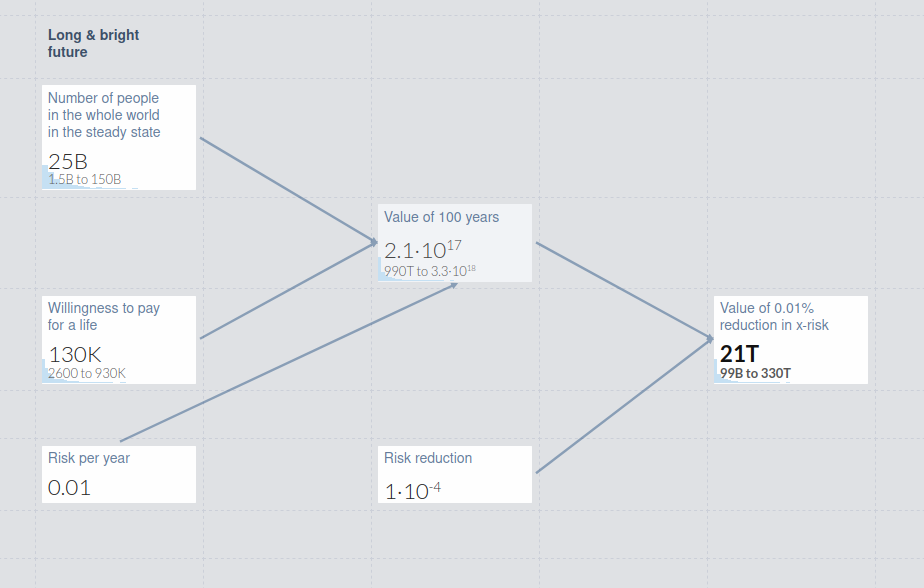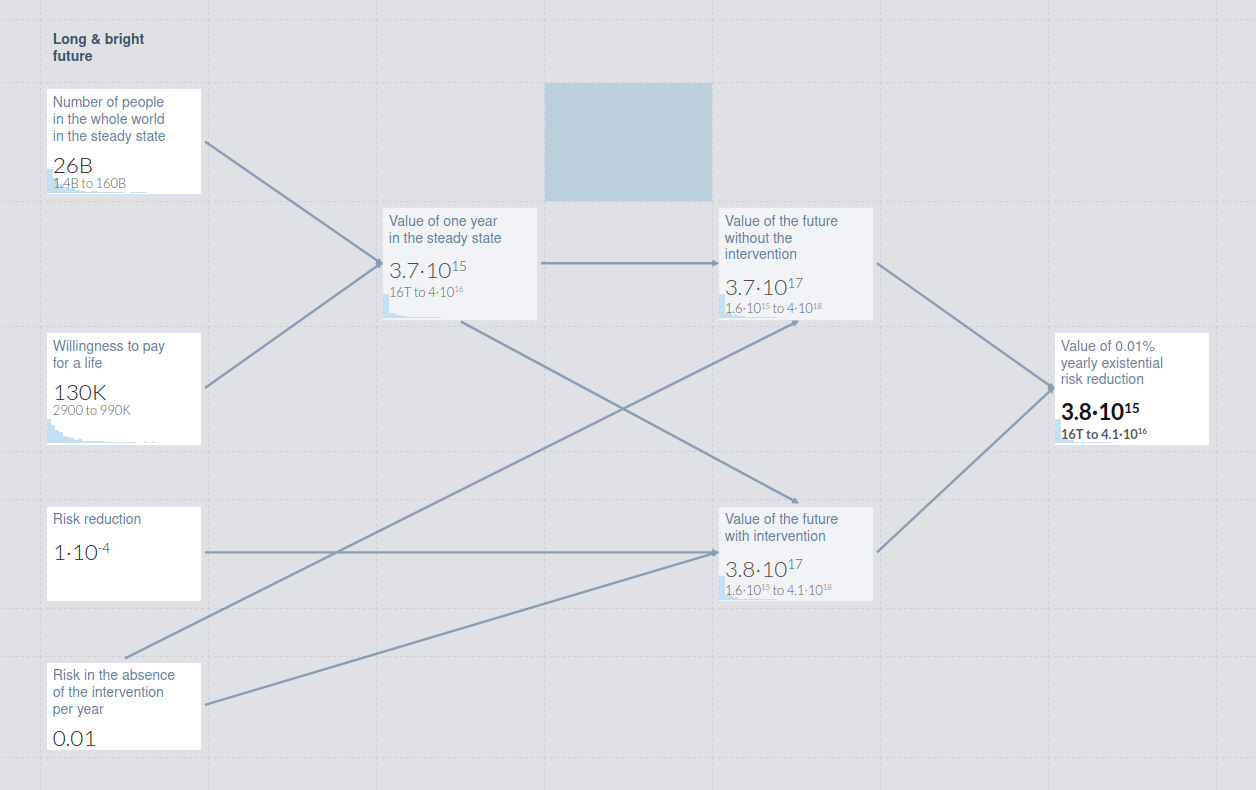I think reducing x-risk is by far the most cost-effective thing we can do, and in an adequate world all our efforts would be flowing into preventing x-risk.
The utility of 0.01% x-risk reduction is many magnitudes greater than the global GDP, and even if you don't care at all about future people, you should still be willing to pay a lot more than currently is paid for 0.01% x-risk reduction, as Korthon's answer suggests.
But of course, we should not be willing to trade so much money for that x-risk reduction, because we can invest the money more efficiently to reduce x-risk even more.
So when we make the quite reasonable assumption that reducing x-risk is much more effective than doing anything else, the amount of money we should be willing to trade should only depend on how much x-risk we could otherwise reduce through spending that amount of money.
To find the answer to that, I think it is easier to consider the following question:
How much more likely is an x-risk event in the next 100 years if EA looses X dollars?
When you find the X that causes a difference in x-risk of 0.01%, the X is obviously the answer to the original question.
I only consider x-risk events in the next 100 years, because I think it is extremely hard to estimate how likely x-risk more than 100 years into the future is.
Consider (for simplicity) that EA currently has 50B$.
Now answer the following questions:
How much more likely is an x-risk event in the next 100 years if EA looses 50B$?
How much more likely is an x-risk event in the next 100 years if EA looses 0$?
How much more likely is an x-risk event in the next 100 years if EA looses 20B$?
How much more likely is an x-risk event in the next 100 years if EA looses 10B$?
How much more likely is an x-risk event in the next 100 years if EA looses 5B$?
How much more likely is an x-risk event in the next 100 years if EA looses 2B$?
Consider answering those questions for yourself before scrolling down and looking at my estimated answers for those questions, which may be quite wrong. Would be interesting if you also comment your estimates.
The x-risk from EA loosing 0$ to 2B$ should increase approximately linearly, so if x is the x-risk if EA looses 0$ and y is the x-risk if EA looses 2B$, you should be willing to pay d=0,01%y−x2B$ for a 0.01% x-risk reduction.
(Long sidenote: I think that if EA looses money right now, it does not significantly affect the likelihood of x-risk more than 100 years from now. So if you want to get your answer for the "real" x-risk reduction, and you estimate a z% chance of an x-risk event that happens strictly after 100 years, you should multiply your answer by 1/(1−z%) to get the amount of money you would be willing to spend for real x-risk reduction. However, I think it may even make more sense to talk about x-risk as the risk of an x-risk event that happens in the reasonably soon future (i.e. 100-5000 years), instead of thinking about the extremely long-term x-risk, because there may be a lot we cannot foresee yet and we cannot really influence that anyways, in my opinion.)
Ok, so here are my numbers to the questions above (in that order):
17%,10%,12%,10.8%,10.35%,10.13%
So I would pay 0.01%0.13%2B$=154M$ for a 0.01% x-risk reduction.
Note that I do think that there are even more effective ways to reduce x-risk, and in fact I suspect most things longtermist EA is currently funding have a higher expected x-risk reduction than 0.01% per 154M$. I just don't think that it is likely that the 50 billionth 2021 dollar EA spends has a much higher effectiveness than 0.01% per 154M$, so I think we should grant everything that has a higher expected effectiveness.
I hope we will be able to afford to spend many more future dollars to reduce x-risk by 0.01%.



Here are my very fragile thoughts as of 2021/11/27:
Speaking for myself, I feel pretty bullish and comfortable saying that we should fund interventions that we have resilient estimates of reducing x-risk ~0.01% at a cost of ~$100M.
I think for time-sensitive grants of an otherwise similar nature, I'd also lean optimistic about grants costing ~$300M/0.01% of xrisk, but if it's not time-sensitive I'd like to see more estimates and research done first.
For work where we currently estimate ~$1B/0.01% of xrisk, I'd weakly lean against funding them right now, but think research and seed funding into those interventions is warranted, both for value of information reasons and also because we may have reasonable probability on more money flowing into the movement in the future, suggesting we can lower the bar for future funding. I especially believe this for interventions that are relatively clear-cut and the arguments are simple, or otherwise may be especially attractive to non(currently)-EA billionaires and governments, as we may have future access to non-aligned (or semi-aligned) sources of funding, with either additional research or early-stage infrastructure work that can then leverage more funding.
For work where we currently estimate >>$10B/0.01% of xrisk, I'd be against funding them and weakly lean against deep research into them, with important caveats including a) value of information and b) extremely high scale and/or clarity. For example, the "100T guaranteed plan to solve AI risk" seems like a research project worth doing and laying the foundations of, but not a project worth us directly funding, and I'd be bearish on EA researchers spending significant time on doing research for interventions at similar levels of cost-effectiveness for significantly smaller risks.
One update that has probably not propagated enough for me is a (fairly recent, to me) belief that longtermist EA has a much higher stock of human capital than financial capital. To the extent this is true, we may expect a lot of money to flow in in the future. So as long as we're not institutionally liquidity constrained, we/I may be systematically underestimating how many $s we should be willing to trade off against existential risk.
EDIT 2022/09/21: The 100M-1B estimates are relatively off-the-cuff and very not robust, I think there are good arguments to go higher or lower. I think the numbers aren't crazy, partially because others independently come to similar numbers (but some people I respect have different numbers). I don't think it's crazy to make decisions/defer roughly based on these numbers given limited time and attention. However, I'm worried about having too much secondary literature/large decisions based on my numbers, since it will likely result in information cascades. M... (read more)